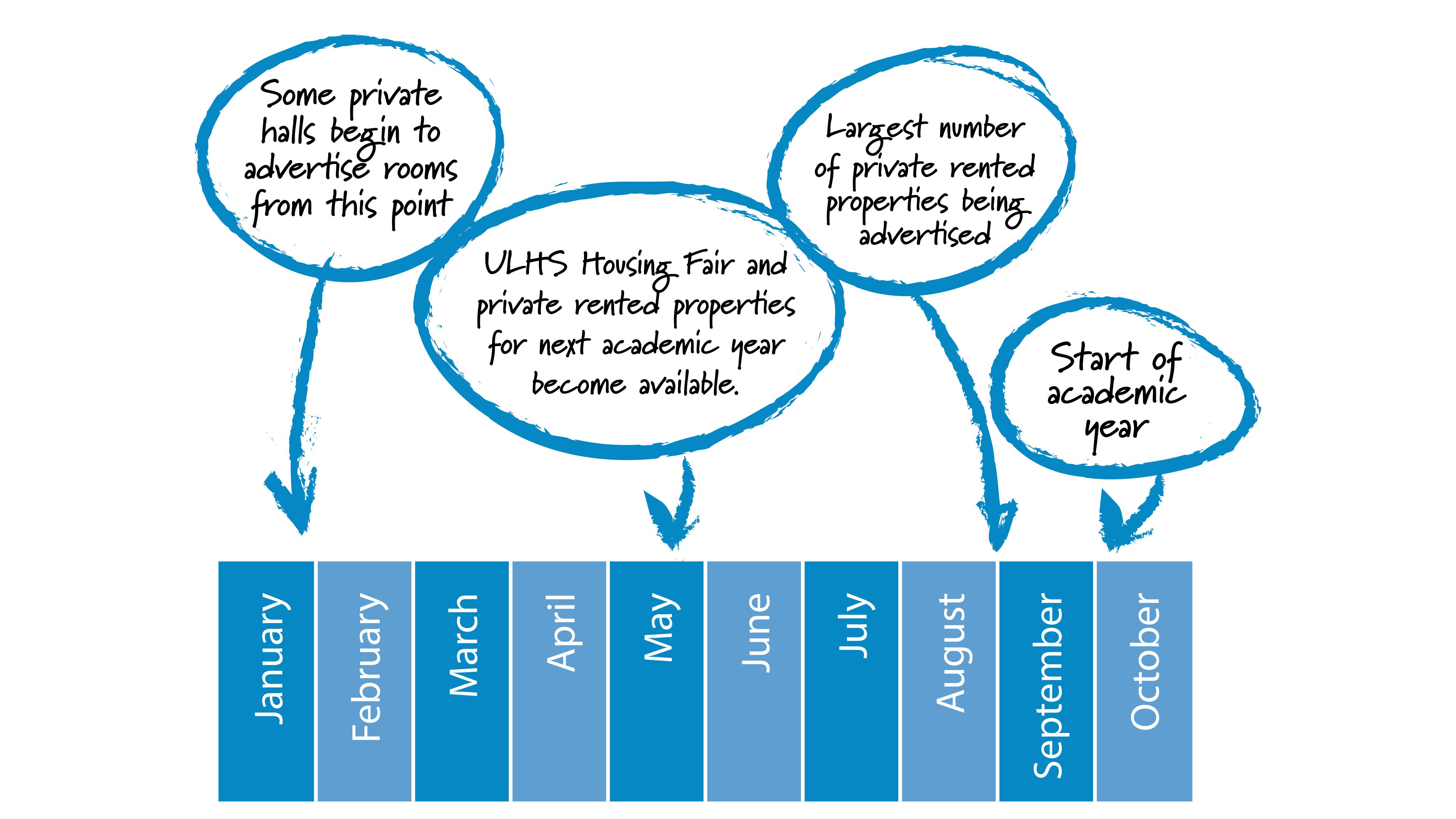Advertising space examples


When to start looking for accommodation
Properties are usually advertised around one to two months before the move-in date. January to April is generally too early to be going on viewings in London.
The ULHS typically hosts the annual Housing Fair in May each year. This begins ‘housing-hunting season’.
Rooms in private halls of residence are generally advertised earlier in the year.
A typical private renting timeline:
SAMPLE FULL HEIGHT ADVERT
SAMPLE FULL HEIGHT ADVERT
Where to look
Check out our Property Platform:
- Search for flats, houses and rooms
- Filter results by price, property type and distance from your campus
- All accommodation providers have signed up to our Code of Good Practice
- You can be confident that the University of London Housing Service will fully investigate any issues or complaints you have.
SAMPLE HALF HEIGHT ADVERT
SAMPLE HALF HEIGHT ADVERT
University accommodation
The University of London also offers accommodation to students! Check out what is available in the Intercollegiate Halls.
Websites
There are many other websites which you can use to search for accommodation. These are some of the most popular ones for students.
Letting agents also advertise here:
• On the Market
• Rightmove
• Zoopla
For individual rooms or flatshares:
• SpareRoom
SAMPLE SMALL IN TEXT ADVERT
SAMPLE SMALL IN TEXT ADVERT
Scams
Not all websites will perform checks on the properties being advertised or the people who are placing the adverts.
Some offers of accommodation will not be genuine. Scammers will often target students, particularly those who are new to London or looking for accommodation online from abroad.
How do I spot a scam?
- The price is a lot lower than for similar properties in the area
- You may be asked to pay a deposit before viewing
- You may be asked to transfer money via a money transfer service such as Western Union
- You are asked to pay a person or company which is different to the agent or landlord
- An internet search shows lots of negative reviews.
Letting agents
Letting agents have access to large numbers of landlords and properties and can be a good way to find accommodation.
Which agent should I use?
There are several letting agents registered with and advertising on the ULHS property platform which you can access via housing.london.ac.uk
Can letting agents charge fees?
There are very strict limits on the fees that letting agents can charge.
Any fees that are charged should:
- Not be ‘hidden’ fees
- Be clearly displayed on the agent’s website and office premises
- Include any additional taxes and charges.
Is my money safe?
All letting agents should be members of a ‘client money protection scheme’. These schemes make sure tenants are compensated if any agent cannot repay their money (e.g. if they go out of business). Agents must advertise which scheme they are members of in their office and on their website. At the time of writing, there are six government approved CMP schemes.
When making any payments (holding/ security deposits and/or rent) be sure to never pay any person other than the landlord or agent company.
Should I trust letting agents?
Remember:
- Letting agents work in the interest of the landlord, not the tenant
- Letting agents or landlords do not always need to draw your attention to the faults or downsides of a property
- Never pay anyone but the letting agent company or landlord.
A letting agent must:
- Be a member of a redress scheme
- Be a member of a client money protection scheme
- Clearly display fees and memberships on their website and office premises
- Have a complaints procedure.
Have a complaint about a letting agent?
- Tell the letting agent
- Get in touch with the ULHS for advice.
- If the complaint cannot be resolved directly, refer it to the redress scheme.
The two redress schemes are:
- The Property Ombudsman tpos.co.uk
- The Property Redress Scheme theprs.co.uk
Professional bodies and accreditation
Some letting agents are members of professional bodies or accreditation schemes and are expected to offer a higher standard of service.
Some of the well-known accreditation schemes include:
- Propertymark propertymark.co.uk (Formerly the Association of Residential Letting Agents)
- Safeagent safeagents.co.uk National Approved Letting Scheme
- RICS rics.org/uk Royal Institute of Chartered Surveyors
- Trading Standards Approved buywithconfidence.gov.uk Vetted and approved by Trading Standards.
Scam warning signs
Unusually low rent, payment before viewing, payment details don't match the agent company or landlord name, money transfer services, all communication is over text or WhatsApp, or things just don’t seem right!
Word of mouth
Sometimes good rental properties are not openly advertised – instead the current tenants can put the landlord or agent in touch with friends or acquaintances who are looking for somewhere to live.
To make sure the place is right for you, ask the current tenants some questions:
- How good is the landlord at responding to repair issues?
- What are the neighbours like?
- How much are the bills?
- What is the local area like?
Newspapers
A small proportion of rooms and properties are advertised in print.
Local newspapers and magazines sometimes advertise rooms or properties under the ‘classifieds’ section. Free newspapers such as The Evening Standard and Metro feature property adverts at least once a week.
Community noticeboards and shop windows
Sometimes rooms and properties are advertised informally on postcards or home-printed adverts.
Caution
Just because a room or property has been advertised on a University noticeboard does not mean that the accommodation has been vetted or approved by your University.
SECTION: Top 6 tips
SECTION: How much does it cost?












